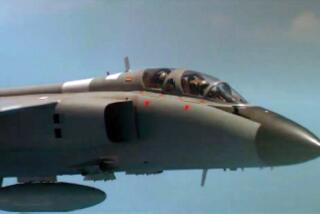In Snub, U.S. Cancels Visit by Chinese Defense Chief
- Share via
WASHINGTON — The Clinton administration on Friday sent yet another signal to China that it is unhappy with Beijing’s continued attempts to intimidate Taiwan, canceling a high-profile visit to the United States by the Chinese defense minister.
The abrupt reversal, announced by Defense Secretary William J. Perry, marked the third time in two weeks that Washington has used diplomatic pressure to convey its displeasure over China’s continued harassment of Taiwan.
Perry had invited Chi Haotian, the Chinese defense minister, for an unusual 10-day visit in early April that was to have included a 19-gun salute, meetings with top officials and key members of Congress and trips to U.S. military installations.
Until the recent tensions, Perry had been one of the administration’s strongest proponents of cementing closer ties with Beijing, visiting his Chinese counterpart in 1994 and pressing for more exchanges of top officers.
But senior defense officials said Friday that with the Chinese military still conducting exercises in the Taiwan Strait, it is “simply not the correct climate” for Chi’s visit.
The move is the latest in a series of steps that the administration has taken to underscore the seriousness with which it views Beijing’s behavior.
Last week, the Pentagon announced that it was deploying a second aircraft carrier battle group to Asian waters to monitor the Chinese military exercises.
On Wednesday, the Pentagon announced that it is selling Stinger antiaircraft missiles to Taiwan, partly as a result of China’s recent decision to step up its low-level helicopter flights near Taiwan.
Officials said the Pentagon will probably reschedule Chi’s visit, possibly as soon as late spring.
At the same time, State Department officials said Secretary of State Warren Christopher still plans to meet Chinese Foreign Minister Qian Qichen on April 21 at The Hague to discuss the Taiwan situation, although the date could be changed slightly for scheduling reasons.
Officials said the Chi trip was canceled because it had been viewed by both sides as a high-profile, ceremonial visit, while the Christopher-Qian meeting is to be a “working” session intended to hammer out differences between the two countries.
*
“We look forward to continuing that dialogue [with China’s military] at the appropriate time,” White House Press Secretary Mike McCurry said.
There was no immediate reaction from China, but the New China News Agency, the official government news service, contended that China, rather than the United States, had canceled the Chi visit to retaliate for Washington’s show of support for Taiwan.
U.S. officials flatly denied that China canceled the visit.
Times staff writer Norman Kempster in Moscow contributed to this report.
More to Read
Sign up for Essential California
The most important California stories and recommendations in your inbox every morning.
You may occasionally receive promotional content from the Los Angeles Times.












